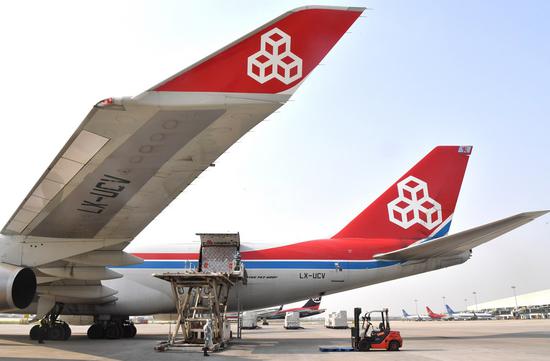
Staff load donated materials onto a cargo plane at Xinzheng International Airport in Zhengzhou, capital of central China's Henan Province, March 22, 2020. The first batch of medical supplies donated by China's Henan Province, including 500,000 surgical masks and 100,000 pairs of medical gloves, departed from Zhengzhou on Sunday for Luxembourg by direct airline along the "Air Silk Road" linking Luxembourg with Zhengzhou. (Xinhua/Li Jianan)
China's Singles Day on Nov. 11 is the world's biggest 24-hour online shopping event. On that day, visitors to the Belgian e-commerce website facealacrise.be were welcomed by the above note, which invited them to explore a myriad of high-quality products on offer from Chinese retailers.
The COVID-19 pandemic has arguably changed the world, and the way people shop is no exception.
As countries all over Europe have closed "non-essential" stores to contain the surge of COVID-19, consumers in increasing numbers have turned to Chinese online shopping websites to purchase the products they are after.
The "logistics backbone" behind the upswing in China's retail sales is air cargo. Shipping companies operate air freight services along multiple routes between China and the countries of Europe along the "Air Silk Road," an aviation industry initiative inspired by the China-proposed Belt and Road Initiative (BRI). The underlying aim is to improve connectivity and foster a sustainable aviation economy.
CREATING OPPORTUNITIES
Liege Airport in southeastern Belgium is the country's largest airport in terms of cargo throughput and is one of Europe's air cargo hubs. The BRI has greatly boosted the airport's development and business prospects in recent years.
On Oct. 27, the Qingdao-Liege all-cargo regular international route was officially opened. It's the latest addition to the air freight services connecting China with Belgium.
The pandemic has forced the suspension of several flights between China and Europe, but the "Air Silk Road" cargo companies at Liege Airport continue to operate at almost full capacity, helping countless small and medium-sized enterprises (SMEs) deliver their products across thousands of miles.
Liege Airport expects to be among the few airports in Europe to maintain a 10-percent growth in 2020. Its annual cargo volume is projected to exceed one million tons for the first time.
Talking to journalists, Luc Partoune, chief executive officer (CEO) of Liege Airport, attributed this to the rapid development of cross-border e-commerce, adding that it benefited not only the aviation industry but also other industries, and not only China but also the world over.
Seizing the business opportunity, Yang Gaijing, an overseas Chinese who has been engaged in the catering industry in Liege for more than 20 years, launched his logistics company this year and wasted no time to join the Singles Day shopping bonanza.
"Online shopping has a huge potential in Europe, unlike in China, where the market is saturated. Our company will also focus on helping European SMEs export to China in the future," he said.
Meanwhile, new cargo routes connecting Belgium's Ostend-Bruges International Airport with a few Chinese cities -- such as Shanghai in East China, Shijiazhuang in North China and Nanchang in South China -- were also opened in late September.
The airport's CEO, Marcel Buelens, told Xinhua at the opening event that he looked forward to closer cooperation between Europe and China and expected his airport to become a hub in this framework.
1